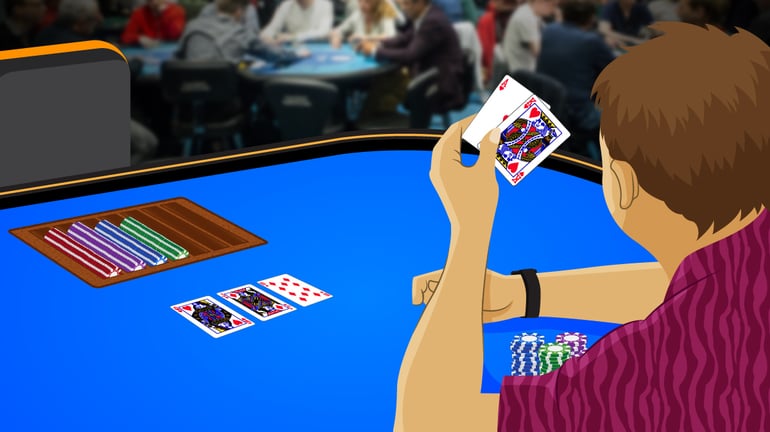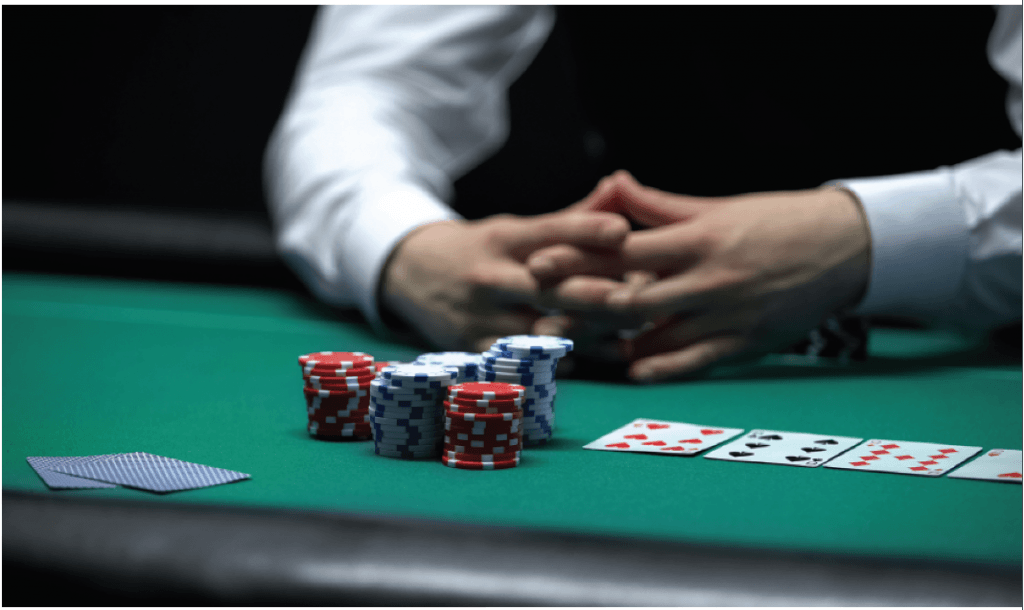Poker Check Nuts River
I played an interesting hand the other day that provides a nice example of how player’s actions imply things about their ranges that we can use to improve our decision making, and perhaps earn more profit with winners or save ourselves some of our losses when beat. These are concepts many readers will have been exposed to before, but sometimes in the heat of battle we lose sight of them. Let’s run through the hand first, and then talk about each street.
- Poker Check Nuts River Float Trips
- Poker Check Nuts River Casino
- Poker Check Nuts River Campground
- Poker Check Nuts River Ranch
- Poker Check Nuts River Reservoir
To clarify, you can't check the nuts if you are the last to act on the river. You can check if you are first in an attempt to try to get your opponent to put some chips in the pot. WATCH: High-Stakes Poker Pro Garrett Adelstein Makes Insane Cash Game Fold Adelstein Check-Folds The River Facing a $14,500 Bet On Live At The Bike!
We are playing in a 200nl full ring game online, with 8 players at this table. With a starting stack of $200, we open from MP with A♠A♥ to $6. The SB ($342.50) and BB ($185.05) both call, and we take the flop 3 handed:
Flop ($18)
2♥3♥4♠
SB: Check
BB: Check
Hero: Bet $6
SB: Raise to $18

BB: Fold
Hero: Call $12
Turn ($54)
2♥3♥4♠Q♣
SB: Check

Hero: Bet $18
SB: Call $18
River ($90)
2♥3♥4♠Q♣2♠
SB: Bet $45
Poker Check Nuts River Float Trips
Hero: Call $45

Poker Check Nuts River Casino

Poker Check Nuts River Campground
Before we reveal the showdown, let’s talk through the hand.
Preflop: We raise to 3x the big blind, which is very standard on 100bb stack depths. Both blinds call. I’m a regular in this pool and don’t recognize either player, so they are not regulars. Beyond that we have no read.
Flop: We bet 1/3rd pot when checked to, and the small blind player check/raises to 3x our bet size, folding out the big blind. What range of hands does this imply? In terms of made hands, the SB check/raising range can include all the sets here. 2 pair combos we can’t be sure about… will the SB call preflop with 43s for example? That seems very ambitious (read: not profitable) not closing the action, a good reg wouldn’t call and a bad reg probably wouldn’t either, but a fun player might. They can also have a hand like A5s for the straight. 65s again is similar in genre to 43s, so we shouldn’t expect to see that too often. Their pure value check/raises are largely sets and A5s. Their bluffs are going to be draws. This board does offer a flush draw, and some straight draws perhaps. A hand like 7s6s makes a nice check/raise bluff with its gut shot, back door spade draw, and no showdown value. The rest of their check/raises are probably overpairs in the 55–TT range mostly, that are raising for a combination of value and equity denial. We decide to call and play the turn in position.
Turn: Now the villain checks to us, and we bet $18 or 1/3rd pot, villain calls. This is the key part of the hand from the perspective of ranging our villain. The pure value check/raises on the flop would tend to always barrel the turn here, and probably for a large sizing. Sets, 2 pairs, and straights can both get value from everything we called the flop raise with, plus people in general tend to continue fast playing these very strong hands on boards that include draws once they’ve “sprung the trap” and raised with them. This makes villain’s range unlikely to include the stronger hands like sets, 2 pairs, and straights and weights them significantly towards the 55-TT over pairs and draws giving up on the bluff but hoping to hit for this price when they check/call turn. There is another category that might play this way… specifically the flush draw that was semi-bluffing the flop, but includes the Q♥, thus turning significant showdown value with top pair. This becomes very relevant when we get to the river.
River: The board pairs the 2, and now our villain decides to lead out for $45 which is half the pot. So now we have a decision, to fold, call or raise. Often players debate internally between folding or calling, and usually click call. The real debate here however should be between calling or raising. By virtue of the turn actions our villain took, they are highly unlikely to have a full house because all holdings that make a full house on this board would have been extremely likely to play the turn more aggressively. So we can conclude that the vast majority of the time here, we are looking at a busted draw that is making a desperate bluff, and one pair hands making a sort of blocking bet (either overpairs to the flop or the Q♥J♥ type hands hands). In essence, I expect us to be ahead virtually all the time with our aces. Nothing is 100% but we are good at a very high frequency based on the action sequence.
In game I chose to call, but I think this was a mistake. My reasoning in game was, villain will simply fold all busted draws to a raise (obviously). And the made hands are all 1 pair which can’t be good facing a river raise, so those will fold too, thus raising gains me no value. I believe this reasoning was flawed however. Specifically in the assumption the 1 pair hands will bet/fold the river. A good player will probably bet/fold to a raise here, if they chose to lead the river rather than check/call, but it’s possible a good player may level themselves into a call given the line they chose. And a fun player may well call simply because they have a pair and want to believe we’re bluffing some busted flush. Another key point to raising is this: If our ranging assessment is accurate, there is virtually no downside to raising. If they fold all worse hands to a raise, there would be no value in raising. But, if they actually hold no better hands than ours (as we suspect from their actions and the subsequent range those actions imply), then there’s literally no risk associated with raising either. Any time we can bet or raise “risk free” (like when we have the nuts for example) it’s a good idea to do that. My actual hand isn’t a 100% lock scenario of course, we can’t fully rule out weirdly played better hands like 44 or A♦2♦ in the hands of a weak player, but we will also get called by worse pairs a lot more than 0% of the time when we raise, and the fun player types who can show up with A♦2♦ are also much more likely to pay off our raise with a hand like 88 and certainly will have much difficulty folding their top pairs like Q♥J♥. On balance, upon further review I felt a river raise carries with it little risk, and will net us more money long term than it loses us thus making it +EV.
Poker Check Nuts River Ranch
By working on ranging your opponents, and modifying/adjusting their range based on the actions they choose, we can sometimes find ourselves with a much clearer decision later in the hand based on the ranges those actions imply. Try and stay in tune with this at the tables, particularly when an action indicates great strength, or when it indicates a lack of great strength, and use this information to your advantage to gain an additional edge.
Poker Check Nuts River Reservoir
Join us on our Discord channel.